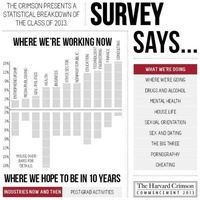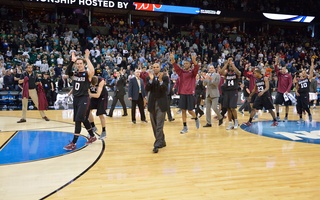Recently, I found myself searching for the meaning of the Harvard education. What had my parents paid their hard earned $120,000 for besides the privilege of displaying the Harvard license frame (my father had eschewed the bumper sticker) on their cars?
I looked for answers among the novels and poems I have read and discussed over the past few years; works filled with angst-ridden protagonists of privileged education, disillusioned but well-meaning idealists in search of greater Truth and Beauty. Were we like Quentin Compson, confused, disenchanted rowers ultimately propelled by our own heightened consciousness to a dire end (near the Weekes footbridge no less)? Or J. Alfred Prufrock (coming and going, speaking of the Michelangelo we had learned so assiduously in our Literature and Arts B class), worried about physical appearance, afraid to eat a peach? Or were we more like Amory Blaine, our reliance on the Office of Career Services indicative of "a new generation dedicated more than the last to the fear of poverty and the worship of success; grown up to find all Gods dead, all wars, fought, all faiths in man shaken..."?
People have many things to say about what they believe Harvard lacks, whether it is The Crimson's diatribe against Harvard's lack of happiness, the Independent's sex survey about lack of social life, discussion in the makeshift community of the shuttle bus about fragmentation, questions about advising raised by student suicides or the disenchanted scholar who once sat next to me and wrote, "section is like a bad first date" in his notebook in lieu of notes. Things can seem dire and dismal amidst the ugly gray of slush and snow or the guilt produced by unopened books during Christmas vacation, and sometimes we forget why we came here in the first place.
But much of the Harvard experience can also be encapsulated by the word best. Think back to Orientation Week, when we were brimming with excitement at being at the "best" school, among some of the best minds, professors and research facilities, at having the best opportunities in life, of making best friends....
Perhaps it is our expectation of the best that makes us despair when anything else occurs. Perhaps the most valuable lesson Harvard imparts to its students is that life contains hills, valleys and a lot of ground in between and that our experience here is ultimately what we make of it. We can do 10 extracurricular activities or none, go out all weekend or stay in, write a thesis or not. It is this ability to decide for ourselves, the frightening control over our destiny and its consequences, that frames both the beauty of a Harvard education and its frustration. We are forever indebted to this institution for fine-tuning our ability to analyze critically and to examine, and yet, it is difficult not to succumb to occasional bouts of heightened consciousness and self-doubt as we analyze and over-analyze our every action. As a smart man named Charles Dickens once wrote, "It was the best of times, it was the worst of times."
A woman who knows a thing or two about trying times sat next to me on the train the other day. Gladys, who now resides in Milton, Mass., survived the Blitz in England during WWII. "Those were some trying times," she recalled. "When you said goodbye to your family and friends in the morning, you never knew if would see them again."
Senior Week is our last barrier between college and the Real World, and it is probably the last time we will see the peers, professors and tutors who played such a critical role in our formative adult years all in one place. Whatever one might think of Harvard, our experiences here have shaped, or will indelibly shape, the course of our lives in the decades to come. Moonlight Cruise. Strawberry Tea. The Last Chance Dance. Their names evoke regret, nostalgia or visions of things past or never been. It is our last chance to remind our roommates how much they mean to us or reconnect with those we haven't seen since Expository Writing. Senior Week marks the end of one thing and the beginning of something else. Cue up the music, and let's party like it's 1999.
Abby Y. Fung '99, a history and literature concentrator in Mather House and executive editor of The Crimson in 1998, has always wanted a column of her own. She likes macaroni and cheese, F. Scott Fitzgerald short stories and the columns of Geoffrey C. Upton '99. She can be reached next year at ayfung@post.harvard.edu or ayf@odysseylp.com.
Read more in Opinion
Along the Campaign TrailRecommended Articles
-
Communication.We invite all members of the University to contribute to this column, but we are not responsible for the sentiments
-
No HeadlineTomorrow the eleven plays the last and most important game of the season. The men have worked hard and earnestly
-
 Magic, Magic, Magic
Magic, Magic, Magic -
Our Periphery PeopleOur periphery people keep our web stable and grounded. They are our source of comfort in scary social situations.
-
 A Letter to the Community from Tommy Amaker
A Letter to the Community from Tommy Amaker -
Foreignizing the FamiliarOf course, it’s impossible to engage with every issue that falls outside of our understanding.













